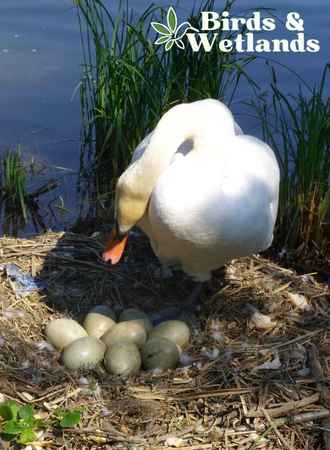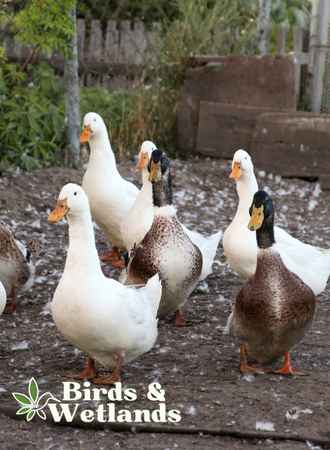In the wild, ducks typically start laying eggs in the spring, when the days begin to lengthen. The exact timing can vary depending on the species and geographical location. Most ducks begin laying when they are about a year old, but some species may start as early as 4 to 5 months. The female usually lays one egg per day until she has a full clutch, which can range from 6 to 12 eggs, before she starts incubating them.
Most wild ducks reach sexual maturity at around 6 to 7 months of age. Heavier duck breeds start laying eggs at 25 to 30 weeks. This means that they can reproduce and lay eggs at this age.
However, the timing of when they start laying eggs can vary depending on various factors, such as suitable nesting sites and food availability. In North America, ducks’ breeding and mating season typically occur from late winter to early spring. During this time, ducks will begin to form pairs and search for suitable nesting sites.
Key Takeaways on Duck Egg Production
- Young ducks lay more eggs than older ducks.
- Most ducks lay an egg daily, but some may lay extra eggs.
- Smaller breeds of ducks reach maturity later than heavier ones.
- Most females lay their eggs between mid-March to late July.
What time of day do ducks lay eggs?
Female ducks tend to lay eggs during the day in the early morning. This egg-laying behavior is partly due to ducks being crepuscular birds, meaning they are most active in the early morning and late evening.
However, some ducks may lay eggs throughout the day or night, depending on their environment and behavior.
For instance, ducks living in areas with extended daylight may lay eggs at different times of day than those living in areas with shorter daylight hours.
Broody ducks lay eggs in the morning because they are influenced by the photoperiod or the length of daylight, which can affect their reproductive hormones and behavior.
They are more active and alert at this time of day, which may make it easier for them to find a suitable nesting site and attend to their eggs.
Laying fertile eggs in the morning may also help to protect them from the heat of the day, as eggs are more sensitive to high temperatures and can suffer from heat stress if left in direct sunlight for extended periods.
The type of duck species can also determine when it lays its eggs. For example, mallards tend to lay earlier than other ducks at 6am , while American Wigeons often wait until later in the morning or even afternoon before beginning to lay their eggs.
Once your duck started laying eggs, make sure you provide it with proper care and hydration. Because the female lays more than half her body weight in eggs in a matter of weeks, the laying period is incredibly stressful for her.
To encourage eggs to be laid, it is recommended to use artificial lighting for a period of around two weeks, especially during the winter months. To ensure that the birds receive sufficient light, it is advisable to supplement natural daylight with artificial light for around 15 hours per day.

How many eggs do ducks lay each day?
The number of eggs a duck will lay each day can vary depending on several factors, including the age and breed of the duck, the availability of food and water, and the environmental conditions.
Ducks are more likely to lay more eggs when they are kept in a comfortable, stress-free environment and provided with an adequate diet.
Most ducks will lay one egg per day during their laying season, although it is common for them to skip a day or lay two eggs in a single day.
Depending on individual characteristics and circumstances, some ducks may lay more or fewer eggs. For example, older or less healthy ducks may lay fewer eggs, while adult ducks that are well-fed and have plenty of access to water may lay more eggs.
But most domestic breeding ducks, such as Welsh harlequins and silver appleyard don’t need a male duck or one drake to lay infertile eggs.

Can ducks lay more than one egg a day?
Raising ducks for eggs can be a rewarding and enjoyable experience, especially if you love these friendly and intelligent birds. But can they lay more than an egg a day?
Most female ducks only lay one egg in a day. However some females can lay two or three eggs, but this is extremely rare. These females are usually domesticated ducks that are raised for egg production and produce relatively larger clutch size.
What time of the year do ducks lay eggs?
Different species of ducks lay eggs at various times throughout the year. For instance, mallards, pintails and American black ducks lay duck eggs in the spring. Other duck species, such as canvasbacks and redheads, begin to lay eggs in the summer, between mid-June and early July.
Regardless of the duck species, the female duck searches for suitable nesting areas before the breeding season starts. The nesting site is usually near the water, hidden in dense vegetation. Some ducks lay eggs in a nest box.
She will build her nest once the nesting site is chosen. The nest is usually made from soft plant materials and lined with down plucked from the female’s breast. Once the nest is built, she will lay eggs and incubate them until all eggs hatch. It would take about 2 weeks for all the eggs to be laid.

When do ducks stop laying?
Female ducks stop laying eggs at around 7-9 years of age. This is a typical life cycle for ducks, and many breeds will cease to lay after that age due to aging. That’s still a lot of eggs laid in a lifetime.
Some ducks can lay eggs slightly longer than the average lifespan, but this is typically uncommon and should not be expected.
Generally speaking, female ducks peak in egg-laying capability between 3 to 5 years old. They may produce multiple eggs per season if properly cared for during this time.
As they get older, the quality and quantity of their eggs will start to decline as their internal reproductive systems become less efficient. After reaching around 7-9 years old, most female ducks will stop laying eggs entirely, although some may continue to lay sporadically if given ideal conditions.
In addition to age affecting a duck’s ability to reproduce, different breeds can also play an important role in determining egg production levels over time. Some breeds are known to have naturally shorter lifespans or lower peak egg production rates than others.
Egg production falls rapidly if you allow too many males access to your egg laying ducks.

Do duck eggs taste like chicken eggs?
Duck eggs generally have a richer, more flavorful taste than chicken eggs. They have more protein and more cholesterol. They are also larger and have thicker shells.
Some people describe the taste of duck eggs as being more “earthy” or “gamey” than chicken eggs, although this can vary depending on the diet and living conditions of the duck.
In general, duck eggs are considered to be a delicacy and are often used in gourmet cooking or baking. They can be used in many ways as chicken eggs, such as in omelets, quiches, or baked goods, but may require some recipe adjustments to account for their unique properties. They are highly regarded by pastry chefs due to their taste and high fat content.

Can you hatch Muscovy eggs artificially?
Yes, it is possible to hatch the eggs of Muscovy ducks artificially using an incubator. Here are the steps you can follow:
- Gather the eggs of the wild bird you want to hatch and place them in an egg carton with the small end down.
- Fill the incubator with warm water and let it sit until the thermometer reads 99-100°F (37.2-37.8°C).
- Place the egg carton in the incubator, making sure the eggs are not touching the sides or the bottom of the incubator.
- Set the incubator’s thermostat to 99-100°F (37.2-37.8°C) and the humidity to about 50%.
- Turn the eggs three times a day, using a gentle rolling motion.
- After about 28 days, the eggs should hatch.
- It’s important to keep the incubator clean and free of bacteria, so be sure to follow proper sanitation procedures.
Are domestic ducks better year-round layers than wild ducks?
Domestic ducks are generally better year-round layers than wild ducks. Domestic ducks have been selectively bred over time to be more productive layers, while wild ducks are more focused on survival and reproduction.
Domestic ducks can lay up to 300 eggs per year, while wild ducks typically only lay a dozen or so eggs per year. Domestic ducks are also more resistant to disease. They can tolerate a wider range of temperatures than wild ducks, making them more reliable layers in various conditions.
However, it’s important to note that individual ducks, whether domestic or wild, can vary in their laying habits and productivity.
Once your duck laid her first egg, switch her to layer feed with more vitamins.



